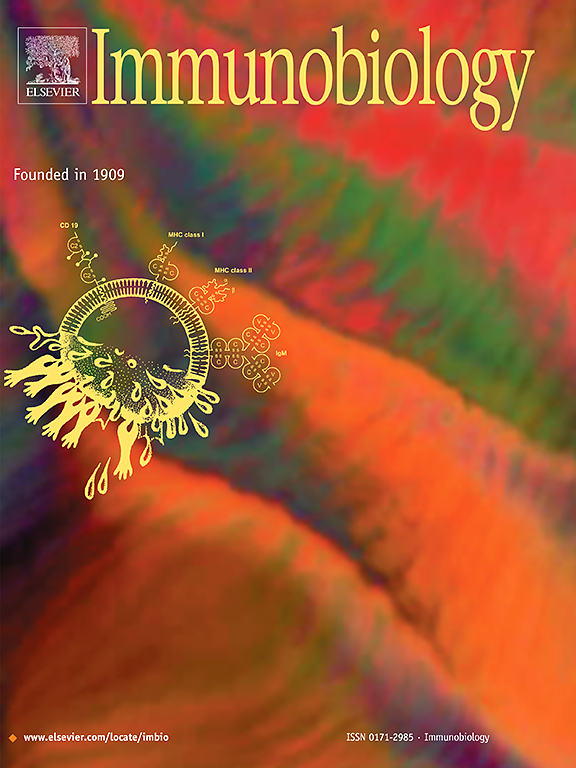血清LINC01278作为败血症的阴性生物标志物,其上调可抑制lps诱导的THP-1细胞炎症反应
IF 2.3
4区 医学
Q3 IMMUNOLOGY
引用次数: 0
摘要
脓毒症是一种以器官衰竭为特征的潜在致命疾病。长链非编码rna (lncRNAs)为脓毒症引起的炎症的治疗提供了新的见解。目的探讨LINC01278在脓毒症和脂多糖(LPS)诱导的炎症反应中的作用。方法LPS刺激THP-1细胞,建立脓毒症细胞模型。CCK-8法检测细胞增殖,流式细胞术检测细胞凋亡。采用RT-qPCR和ELISA分别检测LINC01278、miR-451a及白细胞介素-6 (IL-6)、肿瘤坏死因子-α (TNF-α)、白细胞介素-1β (IL-1β)的表达。使用生物信息学工具预测LINC01278和miR-451a之间的靶向关系,并通过双荧光素酶报告基因检测和RNA免疫沉淀(RIP)验证它们的直接相互作用。结果108例败血症患者血清LINC01278表达明显低于105例健康对照。ROC曲线和Kaplan-Meier结果显示,LINC01278对脓毒症有较好的诊断效果,与不良预后呈负相关。LINC01278过表达可促进细胞活力,抑制细胞凋亡,降低IL-6、TNF-α和IL-1β的产生。生物信息学分析发现,在脓毒症患者中上调的miR-451a是LINC01278的潜在靶点。双荧光素酶报告基因测定以及RIP实验已经证实LINC01278作为miR-451a的竞争性内源性RNA (ceRNA)起作用。结论linc01278可作为脓毒症诊断和疾病严重程度评估的临床指标。LINC01278通过作为miR-451a的ceRNA在脓毒症中发挥保护作用。本文章由计算机程序翻译,如有差异,请以英文原文为准。
Serum LINC01278 serves as a negative biomarker for sepsis and its up-regulation inhibits LPS-induced inflammatory response in THP-1 cells
Background
Sepsis represents a potentially fatal condition characterized by organ failure. Long non-coding RNAs (lncRNAs) have provided new insights into the treatment of inflammation caused by sepsis.
Aims
Exploring the involvement of LINC01278 in sepsis and lipopolysaccharide (LPS)-induced inflammatory responses.
Methods
A sepsis cell model was established by stimulating THP-1 cells with LPS. Cell proliferation was assessed with the CCK-8 assay, while apoptotic cells were quantified through flow cytometric analysis. The expression of LINC01278 and miR-451a, along with the interleukin-6 (IL-6), tumor necrosis factor-α (TNF-α), and interleukin-1β (IL-1β), were measured using RT-qPCR and ELISA, respectively. Bioinformatics tools were used to predict the targeting relationship between LINC01278 and miR-451a, and their direct interaction was validated by Dual-luciferase reporter assays and RNA immunoprecipitation (RIP).
Results
Serum LINC01278 expression was significantly lower in 108 sepsis patients than in 105 healthy controls. ROC curve and Kaplan-Meier results indicated that LINC01278 had a good diagnostic efficacy for sepsis and was negatively associated with poor prognosis. LINC01278 overexpression promoted cell viability, inhibited apoptosis, and reduced the production of IL-6, TNF-α, and IL-1β. Bioinformatics analysis identified miR-451a, which was upregulated in septic patients, as a potential target of LINC01278. Dual-luciferase reporter assays, along with RIP experiments, have verified that LINC01278 functions as a competitive endogenous RNA (ceRNA) for miR-451a.
Conclusions
LINC01278 serves as a clinical indicator for both diagnosing sepsis and assessing disease severity. LINC01278 exerts protective effects in sepsis by acting as a ceRNA for miR-451a.
求助全文
通过发布文献求助,成功后即可免费获取论文全文。
去求助
来源期刊

Immunobiology
医学-免疫学
CiteScore
5.00
自引率
3.60%
发文量
108
审稿时长
55 days
期刊介绍:
Immunobiology is a peer-reviewed journal that publishes highly innovative research approaches for a wide range of immunological subjects, including
• Innate Immunity,
• Adaptive Immunity,
• Complement Biology,
• Macrophage and Dendritic Cell Biology,
• Parasite Immunology,
• Tumour Immunology,
• Clinical Immunology,
• Immunogenetics,
• Immunotherapy and
• Immunopathology of infectious, allergic and autoimmune disease.
 求助内容:
求助内容: 应助结果提醒方式:
应助结果提醒方式:


